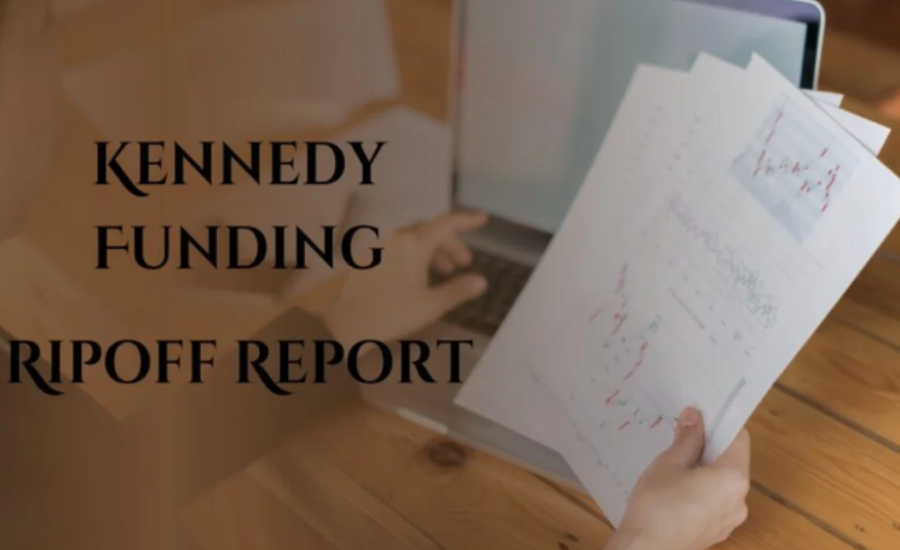Understanding the practices of lending institutions is vital for borrowers, especially in high-stakes industries like real estate. The term Kennedy Funding Ripoff Report has gained attention as borrowers and industry observers question the company’s practices. This article takes a closer look at these allegations, provides an unbiased evaluation of Kennedy Funding’s track record, and offers guidance on navigating the complexities of private lending.
What Is Kennedy Funding?

Kennedy Funding is a prominent direct private lender specializing in hard-money loans, known for catering to real estate investors who require fast access to liquidity. Unlike traditional banks that focus on conventional loan structures and lengthy approval processes, Kennedy Funding steps in to fill the gap for borrowers with unconventional requirements. Their approach prioritizes rapid loan approvals and flexibility, making them an attractive option for high-risk or time-sensitive projects.
What Are Ripoff Reports?
Ripoff reports are user-submitted complaints that often aim to warn consumers about potential fraud, unethical practices, or dissatisfaction with a service provider. These reports are published on public platforms, giving individuals a space to share grievances. However, they come with limitations, such as:
- Anonymous Submissions: Reports can be submitted without verification of identity.
- Lack of Evidence: Many complaints are posted without supporting documentation.
- Potential Bias: Some reports could originate from competitors or disgruntled individuals with personal grievances.
This makes it crucial to approach ripoff reports critically, as not all claims are backed by facts or context.
Exploring The Kennedy Funding Ripoff Report Allegations
Common Complaints
Ripoff Reports Targeting Kennedy Funding Often Revolve Around The following:
- High Fees: Claims of excessive interest rates or upfront charges.
- Misleading Negotiations: Allegations of unclear terms during the loan process.
- Delays in Approvals: Complaints about prolonged timelines, despite the company’s reputation for fast processing.
Frequency and Context
The presence of these allegations, though notable, appears relatively infrequent when viewed against the backdrop of the company’s vast client base. This discrepancy prompts a critical examination: are these complaints merely isolated events stemming from occasional lapses in a large-scale operation, or do they point to deeper, underlying systemic issues that may warrant further investigation? - To better understand this, it’s important to consider the nature and distribution of the complaints. Are they concentrated in specific service areas or regions, or do they occur sporadically across the company’s operations? Patterns in frequency and context could provide valuable insights. For example, recurring complaints about similar issues—such as billing disputes, service delays, or customer support challenges—might indicate a need for process improvements or training enhancements within those areas.
- Additionally, the company’s response to these allegations is equally telling. How quickly and effectively does it address complaints? Does it exhibit transparency and accountability, or does it rely on evasive tactics? A proactive approach to resolving issues and implementing corrective measures could demonstrate a commitment to continuous improvement, whereas a pattern of neglect might suggest a more systemic problem.
- It’s also important to assess the credibility and sources of these complaints. Are they coming from a small group of vocal critics, or do they reflect widespread dissatisfaction? Independent reviews, third-party audits, or even internal investigations could shed light on whether these incidents are outliers or symptoms of a larger issue.
- Ultimately, the relatively low volume of complaints may indicate that the company’s operations are generally robust. However, even isolated incidents should not be dismissed without thorough examination. Every complaint is an opportunity to identify potential vulnerabilities, refine processes, and strengthen the company’s overall reputation. Addressing these concerns transparently and decisively can reinforce trust among clients and stakeholders while mitigating the risk of future issues.
Kennedy Funding’s Response To Ripoff Reports

Kennedy Funding has actively addressed these allegations to maintain its credibility and reassure potential clients. Their efforts include:
- Transparency in Fee Structures: The company publicly outlines its costs to clarify potential misunderstandings.
- Positive Client Testimonials: Success stories from satisfied borrowers highlight the company’s role in enabling real estate projects.
- Case Studies: Detailed accounts of completed loans showcase Kennedy Funding’s reliability and efficiency.
Are Ripoff Reports Always Credible?
Ripoff reports should be assessed critically, as not all claims are created equal. Factors that may affect the credibility of these reports include:
- Unverified Submissions: Many complaints are anonymous and lack corroborating evidence.
- Generic Language: Vague accusations without specifics often reduce the reliability of the claims.
- Motivated Complaints: Reports could stem from competitors seeking to harm a company’s reputation.
Borrowers’ Experiences with Kennedy Funding - Positive Feedback
Many borrowers praise Kennedy Funding for its ability to deliver quick approvals and customized solutions, particularly in situations where time is critical. For individuals or businesses navigating tight deadlines or unexpected opportunities, Kennedy Funding’s expedited loan processing can be a game-changer. Borrowers often highlight the company’s willingness to fund high-risk or unconventional projects, which sets it apart from traditional lenders that typically adhere to stringent criteria. - This flexibility has enabled clients to pursue a wide array of real estate ventures, from commercial developments and land acquisitions to complex construction projects. For many, Kennedy Funding’s readiness to step in when other lenders decline has been instrumental in turning ambitious plans into reality. Borrowers frequently commend the firm’s personalized approach, citing staff members who take the time to understand unique circumstances and tailor loan terms to meet specific needs.
- Negative Feedback
On the other hand, not all borrower experiences have been positive. Some clients express dissatisfaction with the high fees associated with Kennedy Funding loans, which they feel can outweigh the benefits of quick financing. Others cite unmet expectations, such as delays in fund disbursement or terms that seemed less favorable than initially anticipated. - In many cases, these negative experiences stem from a misunderstanding of loan terms. Borrowers who do not fully grasp the specifics of interest rates, repayment schedules, or associated costs may find themselves caught off guard once the loan is finalized. Additionally, challenges encountered during project execution—such as construction delays or changes in market conditions—can exacerbate frustrations, leading some borrowers to attribute their difficulties to the lender.
- That said, Kennedy Funding has demonstrated a willingness to address concerns, and in certain instances, the company has taken steps to improve communication and clarify terms upfront. Borrowers who invest time in thorough due diligence and maintain open communication with the lender are often better equipped to avoid potential pitfalls.
- Ultimately, while Kennedy Funding’s innovative and flexible approach has made it a trusted partner for many, prospective borrowers should carefully evaluate the terms and ensure they align with their project goals and financial expectations. Transparent communication and a clear understanding of the loan structure are key to maximizing the benefits of working with this lender.
Analyzing Ripoff Report Claims

Scrutiny Of Allegations
A deeper analysis of some complaints reveals that many lack specific details or evidence. This diminishes their impact and calls into question their validity.
Legal Actions
Kennedy Funding has, on occasion, taken legal action to address defamatory claims, demonstrating their commitment to protecting their reputation and clarifying misconceptions.
Challenges In The Hard-Money Lending Industry
The nature of hard-money lending itself often contributes to negative perceptions:
- High-Risk Nature: Hard-money lenders assume greater risks, leading to higher fees and interest rates. Borrowers unfamiliar with this industry norm may misinterpret these terms.
- Market Volatility: Fluctuations in real estate markets can lead to unforeseen delays, which may affect borrowers’ experiences.
Evaluating Ripoff Reports For Credibility
To navigate the claims effectively, borrowers should adopt a systematic approach:
- Cross-Check Information: Compare ripoff reports with independent reviews on verified platforms like the Better Business Bureau (BBB) or Trustpilot.
- Contact the Lender Directly: Reaching out to Kennedy Funding for clarification on terms or addressing concerns directly can often resolve misunderstandings.
Kennedy Funding’s Unique Strengths

Fast Approval Process
Kennedy Funding’s ability to process and approve loans within days is a significant advantage for borrowers navigating time-sensitive deals.
International Expertise
The company’s operations extend globally, offering borrowers access to expertise in diverse markets and legal frameworks.
How Borrowers Can Protect Themselves
- Understand Loan Terms: Review all terms and conditions in detail to avoid surprises. Ask questions about fees, timelines, and contingencies before signing any agreements.
- Research the Lender’s Credibility: Check multiple sources, including client testimonials and verified platforms, to gain a comprehensive understanding of the lender’s reputation.
Conclusion
The Kennedy Funding Ripoff Report allegations highlight the complexities of private lending and the importance of informed decision-making. While these reports raise valid concerns, many lack substantiation or context. Kennedy Funding’s track record as a reputable private lender remains solid for countless satisfied clients.
For prospective borrowers, thorough research and a clear understanding of loan terms are critical to ensuring a positive experience. By approaching the process with due diligence, borrowers can navigate the challenges of the lending industry confidently, whether with Kennedy Funding or any other lender.
Frequently Asked Questions About Kennedy Funding And Ripoff Reports
1. What is Kennedy Funding?
Kennedy Funding is a direct private lender specializing in hard-money loans, particularly for real estate investors. They focus on providing fast approvals and flexible terms, catering to borrowers with unconventional or high-risk projects
2. Why are there Ripoff Reports about Kennedy Funding?
Ripoff Reports are user-submitted complaints that may allege issues such as high fees, unclear terms, or delays in loan processing. These reports aim to warn consumers but often lack verification or supporting evidence.
3. Are Ripoff Reports reliable?
Not always. Ripoff Reports are typically anonymous and unverified, meaning they can stem from personal grievances, misunderstandings, or even competitors seeking to harm a company’s reputation. It’s essential to approach them critically and cross-check claims with credible sources.
4. What are the common allegations against Kennedy Funding?
The most frequent complaints include:
- High interest rates or fees.
- Misleading or unclear loan terms.
- Delays in the approval process despite claims of rapid processing.
5. How does Kennedy Funding respond to these allegations?
Kennedy Funding addresses complaints by:
- Offering transparency in their fee structures.
- Highlighting positive client testimonials and success stories.
- Providing detailed case studies to showcase their efficiency and reliability.
6. Are Kennedy Funding’s fees higher than traditional lenders’?
Yes, as a hard-money lender, Kennedy Funding typically charges higher fees and interest rates. This is standard in the industry due to the higher risk associated with hard-money loans and the expedited approval process.
Stay in the know with the latest news and updates on Nftrandomize.co.uk
